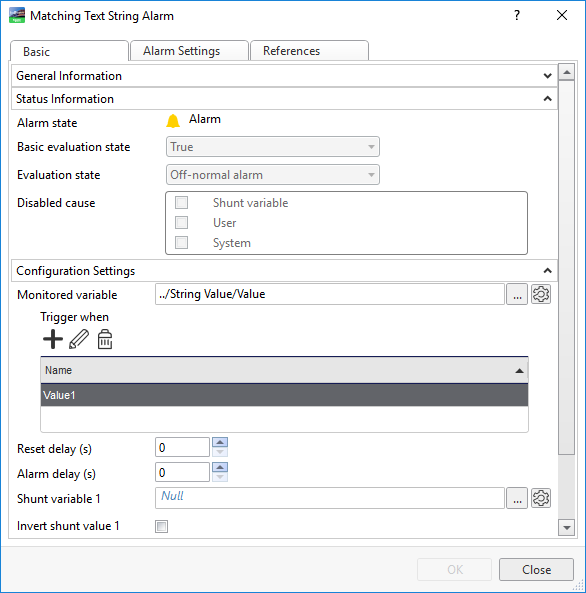
用户界面
Matching Text String Alarm Properties – Basic Tab
Use the Basic tab to view or edit the basic properties of a matching text string alarm.

|
Component |
Description |
|
Alarm state |
Displays the present state of the alarm. 有关更多信息,请参阅 Alarm States . |
|
Basic evaluation state |
Displays False when the alarm is in its normal state. |
|
Evaluation state |
Displays the present evaluation state of the alarm. For example, Upper limit alarm is displayed when the monitored value reaches the upper alarm limit. |
|
Disabled cause |
Displays the cause for the alarm being disabled:
|
|
Monitored variable |
Enter the path to the variable that is monitored by the alarm. |
|

|
Add Click to create a new alarm trigger item. 有关更多信息,请参阅 Create Object Wizard – Naming the Object Page . |
|

|
Edit Click to edit the alarm trigger item. 有关更多信息,请参阅 Alarm Trigger Properties – Value tab . |
|

|
Remove Click to remove an alarm trigger item. |
|
Reset delay (s) |
Enter the time, in seconds, the alarm has to be within the reset criteria before the alarm state is changed from alarm to reset. 有关更多信息,请参阅 Time Delay . |
|
Alarm delay (s) |
Enter the time, in seconds, the alarm has to be within the alarm criteria before the alarm is triggered. 有关更多信息,请参阅 Time Delay . |
|
Shunt variable 1 |
Enter the shunt variable that is used to enable or disable the alarm. 有关更多信息,请参阅 Shunt Variables . |
|
Invert shunt value 1 |
Select to invert the shunt value, that is, enable the alarm when the shunt value is active and disable the alarm when the shunt value is inactive. 有关更多信息,请参阅 Shunt Variables . |
|
Shunt operator |
Select AND or OR to add logic between the first and the second shunt variable. 有关更多信息,请参阅 Shunt Variables . |
|
Shunt variable 2 |
Enter the second shunt variable that is used to enable or disable the alarm. 有关更多信息,请参阅 Shunt Variables . |
|
Invert shunt value 2 |
Select to invert the shunt value, that is, enable the alarm when the shunt value is active and disable the alarm when the shunt value is inactive. 有关更多信息,请参阅 Shunt Variables . |
 Matching Text String Alarms
Matching Text String Alarms
 Matching Text String Alarm Properties – Alarm Settings Tab
Matching Text String Alarm Properties – Alarm Settings Tab
 References Tab
References Tab
 Create Object Wizard – Naming the Object Page
Create Object Wizard – Naming the Object Page
 Alarm Trigger Properties – Value tab
Alarm Trigger Properties – Value tab
 Alarm States
Alarm States
 Time Delay
Time Delay
 Shunt Variables
Shunt Variables